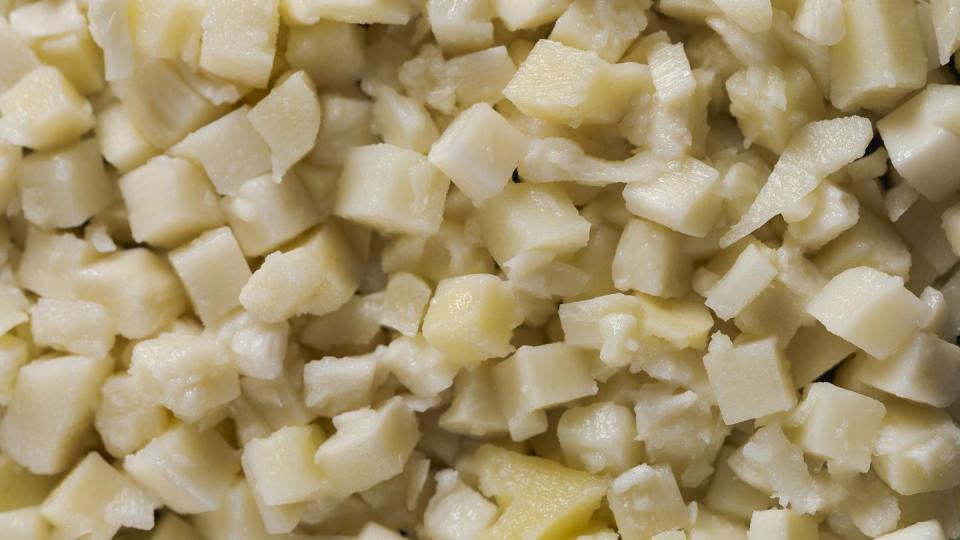The Dark Truth About Hearts Of Palm

"Hearst Magazines and Yahoo may earn commission or revenue on some items through these links."
Hearts of palm are almost magical: You can make them taste like mozzarella sticks, turn them into a low-carb noodle, and even fry them up into a vegan fish and chips. It's hard to knock them, with all the ways you can use the so-called "swamp cabbage" or "lobster of vegetables."
Growing abundant in forests from South America to Asia, many palm tree varieties (like peach palm, coconut palm, açaí palm, and sabal palm) are prized for their cores, a.k.a. hearts of palm, which have been used in cooking since the time of the Mayans. With a tender texture and lightly vegetal flavor, hearts of palm are a versatile addition to salads, stir-fries, and pasta dishes and often likened to artichoke hearts, water chestnuts, and cauliflower.
But this superfood is hardly innocent, especially when it comes to the health of the environment, local wildlife, and the workers who harvest it. As it turns out, the drama surrounding hearts of palm has almost reached Narcos levels of controversy.

The Core of the Hearts of Palm Issue
With their recent surge in popularity, hearts of palm harvesting has caused a world of pain for single-stalked palms (like coconut palm and sabal palm) and the animals who make their homes near these towering trees. Harvesting the core from a palm tree with only one stalk means the entire plant dies, leading to deforestation and destructive monocultures. In some cases, species of palm trees are reaching near extinction. Loggers who are hungry to cash in on the global appetite for the crop have been found to be illegally clearing large swaths of rainforest in order to over-harvest the hearts, often targeting older plants which produce the seeds that allow trees to reproduce.
In Brazil, a country that was once both the largest producer and consumer of hearts of palm, illegal harvesting of the single-stalked juçara palm (a cousin of açaí) ran rampant across the country, leading to its near extinction. Nowadays, multi-stalked palms grown in Costa Rica and Ecuador are the most popular varieties. But this has yet to stop the black market from disguising hearts from the juçara palm, a variety whose harvesting has been banned since 2008, as more sustainable options like peach palm.
Emissions from international shipping can also be called into play. While you can grow hearts of palm in warm and humid places like Florida, conservation laws often limit their harvest. This means that the canned hearts of palm you see at the store has racked up some frequent flier miles from places like Bolivia, Brazil, and Costa Rica.
Perhaps most distressingly, researchers found that, from 1995 to 2015, the deforestation caused by the harvesting of products like hearts of palm has lead to the estimated loss of 100,000 orangutans in Borneo alone. And that's not even to mention the elephants, rhinos, and other species affected by the loss of their habitats.
The Future of Hearts of Palm Harvesting Is Becoming Less Heart-Breaking
There are close to 2,600 varieties of palm trees, many of which are multi-stalked and can be harvested sustainably since the plant does not die. Even the juçara palm population is being rebuilt, with many farmers effectively returning the land back to nature and adopting sustainable practices for harvesting single-stemmed varieties like juçara.
Suppliers and brands are taking note of the rising consumer concern over the sustainability of hearts of palm, leading many to signify ethical practices on their packaging. Double-checking the brands and countries where your hearts of palm come from is always wise; as is looking out for the single-stemmed varieties that are at the heart of the issue.
Easy-to-find brands like Native Forest, Delallo, and Thrive Market have all earned high marks from the Environmental Working Group, who regularly publish reports on the environmental safety of various products. Trader Joe's viral hearts of palm pasta is made sustainably in Ecuador, meaning you can help out orangutans and have your hearts of palm pad Thai, too.
You Might Also Like

